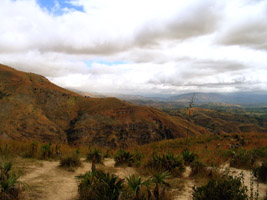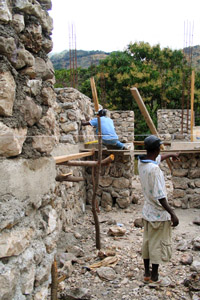Helping Haiti
Novelist Christopher Hebert went to Haiti hoping to help—and he left the country realizing how complicated helping can be
There is no Home Depot in Bouli, Haiti. That fact is obvious, of course, but the significance of it is substantial. It means, for instance, that virtually every material for building must be found nearby. In such a remote place, even cinder blocks are out of the question; they’re too heavy for donkeys to carry in any significant number. To build a wall you need rocks and cement. Rocks come from wherever you can find them: fields, paths, riverbeds. And the cement is not the pre-mixed kind; it requires sand, lots of it. To get the sand, you dig a hole and then you sift the dirt to remove the stones and gravel, a slow, laborious process. Making cement also requires water. Since there’s no garden hose, every bucket must be carried up from the spring, which dribbles out of a pipe a hundred yards away.
It’s these complicated logistics that we’re puzzling through as we stand at the construction site. Before us is our task: the dirt floor. Beyond is the means with which we’re to finish it: sacks and sacks of cement.
We’re in the process of trying to assemble a viable plan for what we think we have to do when the Haitian crew arrives. Just in time, it turns out, to save us from mucking up the entire house and wasting most of the materials.
 There are six guys on the crew, all in their twenties and thirties. They take little notice of us. The minute they get here, they set to work. They know exactly what needs to be done, and we—it immediately becomes clear—don’t have a clue.
There are six guys on the crew, all in their twenties and thirties. They take little notice of us. The minute they get here, they set to work. They know exactly what needs to be done, and we—it immediately becomes clear—don’t have a clue.
We settle into our roles. The Haitians are the craftspeople. We are the common laborers. We tote water and cement, carry rocks, sift sand. Mostly we just try to be useful and not get in their way. All except for the young contractor in our volunteer group, whose feats of strength and endurance earn him the honorific Jom-Jom (translation: “Strong-Strong”) from the Haitian crew. They are not easily impressed. With the exception of Jom-Jom, we cannot begin to keep up with them.
The guy mixing the concrete, using only a shovel, is especially tireless. He’s in his early twenties, slim and strong and absolutely silent. When he needs something, he points. He doesn’t waste his breath on words he knows we won’t understand. He mixes the cement on the ground, scooping, stirring, never stopping. I try to join him more than once with a second shovel, but I can manage barely half a dozen stirs before my arms start to burn. He goes on like this for hours, leaving little doubt as to which one of us is truly essential here.
Toward the end of the day, as several of us are on a water break, a man in his late thirties approaches us. His English is better than most; almost no one in Bouli speaks any English at all. And among the ten of us we have only a few dozen words of Creole.
 “Not good,” he says. We are sitting, and he is standing, stabbing his index finger in the air between us. “You should not be here.”
“Not good,” he says. We are sitting, and he is standing, stabbing his index finger in the air between us. “You should not be here.”
There is a long silence as we Americans eye each other warily. We all heard the same thing, but is it possible we misunderstood?
“You don’t want us here?” someone asks.
We can understand only some of his response, but his gestures, his expression, and the tone of his voice are perfectly clear.
In a mixture of English and Creole, we ask if it’s the clinic or the guest house or just us that’s the problem. But with every failed exchange his anger creeps closer and closer to rage.
One at a time, we wander off back to work.
When I ask him later, Johnny, our translator, suggests the man might have shown up looking for work. Johnny adds, with his usual diplomacy, that the man might have felt the work we were doing should have been done by someone like himself.
It’s a fair point. More than fair, in fact. In a country where around two thirds of the workforce is unemployed, who could blame a man for being annoyed at the sight of tourists fumbling through a job for free that he’s more qualified to do himself?
 This is another part of the debate surrounding volunteer work and NGOs in developing countries like Haiti. For some observers, trips like ours create more problems than they solve. In addition to stressing fragile infrastructure and wasting scarce resources, these visits are said to deprive locals of much-needed jobs. A number of critics have contended that with the exception of trained medical personnel and others offering specialized skills, people who want to help should do so by sending checks to established aid groups, rather than coming in person.
This is another part of the debate surrounding volunteer work and NGOs in developing countries like Haiti. For some observers, trips like ours create more problems than they solve. In addition to stressing fragile infrastructure and wasting scarce resources, these visits are said to deprive locals of much-needed jobs. A number of critics have contended that with the exception of trained medical personnel and others offering specialized skills, people who want to help should do so by sending checks to established aid groups, rather than coming in person.
After a day working side by side with an experienced Haitian crew, it’s hard for me to deny that my checks have done more good than my prowess with a shovel. And yet, I cannot say I’m sorry I came.
At around five o’clock, we break for the day. The floor is mostly done, as are several other projects we hadn’t anticipated. We’re dusty and dirty and sweaty and tired. My legs and arms are gray with cement. Nightfall comes at six, and we want to wash off in the river before dark.
As we collect our bags and water bottles, the Haitian crew keeps working; they will work until sundown.
Only later, as we’re eating dinner, do we learn just how much this crew has done today. What we saw for ourselves, it turns out, was only half of it. Not only did their day end after ours, it began long before we awoke.
Although the crew is from Bouli, they came here this morning from Boucan-Carré. The long trip we made the day before they themselves made this very morning. Unlike us, however, they had no car to drive them half way to Sivol, no donkeys to take them from Sivol to Bouli. Their morning commute, around twelve miles, took them somewhere around five or six hours. Which they managed on foot, carrying their tools.
And then, without pausing, they proceeded to build a house.
Christopher Hebert is the author of The Boiling Season, a novel inspired by recent events in Haiti. He is Jack E. Reese Writer-in-Residence at the University of Tennessee Libraries. To read the full version of “Helping Haiti,” please click here. To read Madison Smartt Bell’s interview with Hebert, click here.


